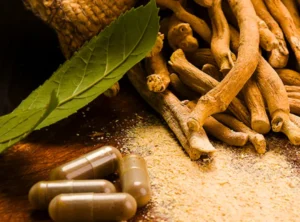
Why does sleep change during menopause?
During this transition, hormone levels especially estrogen and progesterone drop. This shift affects your body’s temperature regulation, triggers hot flashes and night sweats, and can also reduce melatonin production, the hormone responsible for signaling sleep.
The result? Trouble falling asleep, disrupted nights, and fatigue the next day.
Start with lifestyle changes

Before turning to treatments, a few simple lifestyle adjustments can already transform your nights:
Stick to a sleep routine: Go to bed and wake up at the same time every day even on weekends.
Create the ideal sleep environment: Keep your bedroom dark, quiet, and cool.
Avoid stimulants in the evening: Caffeine, alcohol, nicotine, and heavy meals can disrupt your night.
Limit screen time before bed: Blue light interferes with your body’s natural sleep rhythm.
Get moving: Gentle exercise, like walking, helps regulate your body but avoid intense workouts at night.
Adopt relaxation techniques: Deep breathing, gentle yoga, light reading, or a warm bath can help slow your mind and body down.
Natural alternatives that truly help

If healthy habits alone aren’t enough, there are natural ways to help your body relax and find the balance it needs for restful sleep.
Meditation and conscious breathing: Calm the mind and soothe the nervous system.
Relaxing music or nature sounds: Create a peaceful environment that encourages sleep.
Gentle dancing or nighttime stretching: Release built-up tension and promote well-being.
Herbal teas made from medicinal plants are also powerful allies for menopausal sleep support. Here are five of the most effective:
🍵 Valerian
A natural sedative, valerian helps you fall asleep faster and improves sleep quality. It’s rich in valerenic acid, which interacts with GABA receptors in the brain the same receptors targeted by many calming medications.
🌼 Passionflower (Passiflora)
Ideal for nighttime anxiety, passionflower contains flavonoids that act as mild tranquilizers. It soothes mental agitation and helps the body ease into sleep.
🌿 Lemon Balm (Melissa officinalis)
Known for its gentle calming and digestive effects, lemon balm reduces restlessness and supports deep relaxation. It’s especially helpful when tension shows up in both body and mind.
🌸 Chamomile
A traditional favorite, chamomile is rich in apigenin a natural compound that binds to receptors in the brain and promotes sleep. It’s gentle, soothing, and safe for regular use.
🍃 Hops (Humulus lupulus)
Yes, the same plant used in beer! Hops have mild sedative properties that can reduce nighttime wakefulness and ease nervous tension, especially effective when combined with valerian.
Natural phytohormones: Gentle hormone balance

Some plants contain phytohormones compounds that mimic human hormones and help rebalance the body during menopause.
Great natural sources include:
Soy (isoflavones) – helps balance estrogen levels.
Flaxseed (lignans) – supports hormone metabolism and digestive health.
Wild yam – aids in natural hormonal modulation and overall well-being.
These foods, when consumed regularly and with proper guidance, may help reduce hot flashes, boost mood, and support better sleep.
Body and mind in harmony: relax, breathe, reconnect

In addition to teas and herbs, calming practices like guided meditation, deep breathing, aromatherapy baths, massage with essential oils (such as lavender or ylang-ylang), and gentle dancing can help you reconnect with your body, relieve stress, and transition peacefully into sleep.
These rituals aren’t just effective they’re healing. They remind you to care for yourself lovingly, to honor your rhythms, and to embrace rest as a sacred part of your health.
When to seek help?
If your insomnia lasts more than three months, interferes with your emotional health or productivity, or if symptoms become overwhelming, don’t hesitate to consult a health professional. Quality sleep is essential for your physical, mental, and emotional well-being and you deserve restful, restorative nights.

Final thoughts
Menopause doesn’t have to mean sleepless nights. With the right information, daily care, and natural alternatives, it’s possible to move through this stage with balance and peace.
Start with small changes, listen to your body, and embrace rest as an essential part of your health journey.
You are not alone in this and yes, restful sleep can be your new normal, even during menopause.
In summary:
Menopausal insomnia is common, but there is a solution.
Change small habits and create sleep rituals.
Rely on herbal remedies and teas to help your mind and body relax.
Try wellness techniques like dance, meditation, aromatherapy, and breathing.
And if necessary, seek professional support. Taking care of your sleep is taking care of your overall health.
Scientific studies
Study on CBT-I, Sleep Restriction, and Sleep Hygiene
Title: Treating Chronic Insomnia in Postmenopausal Women: A Randomized Controlled Trial
Publication Date: December 11, 2018
Link: https://pubmed.ncbi.nlm.nih.gov/30481333
Meta-analysis on Nonpharmacological Interventions
Title: Effects of Nonpharmacological Interventions on Sleep Quality and Insomnia in Perimenopausal and Postmenopausal Women: A Meta-Analysis of Randomized Controlled Trials
Publication Date: February 9, 2023
Link: https://pubmed.ncbi.nlm.nih.gov/36766902
Reviewed and written by: Vilma Mendonça – Pharmacist






